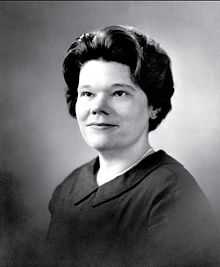Barbara Ringer
| Barbara Ringer | |
|---|---|
 | |
| 9th Register of Copyrights | |
| In office November 19, 1973 – May 30, 1980 | |
| Preceded by | Abe A. Goldman |
| Succeeded by | David Ladd |
| Acting Register of Copyrights | |
| In office November 1993 – August 1994 | |
| Preceded by | Ralph Oman |
| Succeeded by | Marybeth Peters |
| Personal details | |
| Born | May 29, 1925 Lafayette, Indiana |
| Died | April 9, 2009 (aged 83) Lexington, Virginia |
| Spouse(s) | unmarried |
| Children | none |
| Residence | Bath County, Virginia |
| Alma mater | Columbia Law School (J.D.), George Washington University (B.A. and M.A.) |
Barbara Ringer (1925–2009) was the first female Register of Copyrights in the United States Copyright Office, an important contributor to United States copyright law in the 20th century, and a key force behind the preparation and passage of the 1976 Copyright Act.[1][2][3]
Early life
Barbara Ringer was born in Lafayette, Indiana on May 29, 1925 and received her undergraduate and masters degrees from George Washington University. She became one of the first females to attend Columbia Law School, receiving her law degree from there in 1949. After graduating, she joined the staff of the Copyright Office as an examiner.
Copyright Office Career
Ringer consistently advanced in the Copyright Office throughout the 1950s, eventually becoming assistant Register of Copyrights in 1966. She helped draft the Universal Copyright Convention in 1955 and represented the United States during several international copyright talks.[2]
In 1971, Ringer sued the Library of Congress for sex discrimination and race discrimination after being passed over for promotion to the position of Register of Copyrights.[4][5] She worked as director of the Copyright Division of the United Nations Educational, Scientific, and Cultural Organization (UNESCO) in Paris from 1972 to 1973 while the case was being litigated. She was eventually successful in the lawsuit and became the 9th Register of Copyrights on November 19, 1973.
Work on 1976 Copyright Act
During her career at the Copyright Office, Ringer was instrumental in the process leading up to the passage of the 1976 Copyright Act.[6] She worked closely with Registers Arthur Fisher and Abraham Kaminstein throughout the 1950s and 1960s to update copyright law in light of the technological progress since the 1909 Copyright Act. She also played a large role negotiating with the many divisive private interests that played a role in the drafting process. The result was one of only two wholesale revisions of copyright law in U.S. history.
Ringer herself described the 1976 Copyright Act as being
not a ‘general revision’ in the same sense that the 1909 Act was, i.e., a bringing together of scattered statutory provisions with relatively few changes or innovations. The New Act is rather a completely new copyright statute, intended to deal with a whole range of problems undreamed of by the drafters of the 1909 Act. Even more important, the new statute makes a number of fundamental changes in the American copyright system, including some so profound that they may mark a shift in direction for the very philosophy of copyright itself. Properly designated, the New Act is not a ‘general revision,’ but is as radical a departure as was our first copyright statute, in 1790.[7]
In 1977, Ringer was awarded the President's Award for Distinguished Federal Civilian Service, for her role in the passage of the 1976 Copyright Act.
Retirement and Later Life
Ringer retired from the Copyright Office on May 30, 1980 and moved to rural Bath County, Virginia, where she lived alone, having never married nor have children. She subsequently joined the law firm of Spencer & Kaye.
In 1993, she returned to the Copyright Office to serve as cochair of the Librarian's Advisory Committee on Copyright Registration and Deposit and then as acting Register of Copyrights from November 1993 to August 1994. The Library of Congress awarded her its Distinguished Service Award in 1995 for her "lifetime contributions to the field of copyright, both nationally and intentionally, and for her contributions to the Library of Congress over a period of 40 years."[8]
Ringer died in a nursing home in Lexington, Virginia, on April 9, 2009.
References
- ↑ "Barbara Ringer". Library of Congress. (undated).
- ↑ 2.0 2.1 Nierman, Judith (April 2009). "Barbara Ringer, 9th Register of Copyrights, Dies". Copyright Notices (Special Edition) (Library of Congress).
- ↑ Stephen Miller, She Helped Put her Stamp on Copyright Law, Wall Street Journal, May 9, 2009
- ↑ Schudel, Matt (April 29, 2009). "Barbara Ringer's Untold Story". Washington Post.
- ↑ Ringer v. Mumford, 355 F.Supp. 749 (D.C. Circ., 1973)
- ↑ Matt Schudel, Force Behind New Copyright Law, Washington Post, April 26, 2009.
- ↑ Jessica Litman, Copyright, Compromise, and Legislative History, 72 Cornell L. Rev. 857 (July 1987).
- ↑ Librarian Honors Former Register Copyrights Barbara Ringer
External links
- Patry, William (April 9, 2009). "Barbara Ringer". Retrieved November 14, 2011.
| Government offices | ||
|---|---|---|
| Preceded by Abe A. Goldman |
Register of Copyrights 1973–1980 |
Succeeded by David Ladd |
| Government offices | ||
|---|---|---|
| Preceded by Ralph Oman |
Acting Register of Copyrights 1993–1994 |
Succeeded by Marybeth Peters |
|